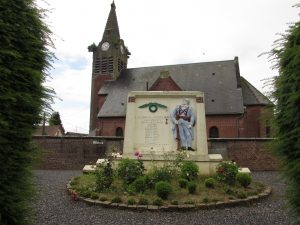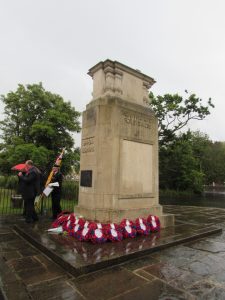A few days ago, it was Remembrance Sunday in the United Kingdom. At 11 AM the Royal Family paid tribute to the nation’s fallen in a solemn wreath laying ceremony at the Cenotaph in Whitehall. The annual event features veterans, members of the Royal British Legion, who march past the cenotaph to pay their respects to their fallen comrades. The tradition is just one of the ways through which Britons have come to understand the legacy and meaning of their wars, particularly the First World War, and to manage it as part of their sense of national consciousness.
Our project has been live for a year now. In that time, we have gotten to know Jack Peirs and his family through his letters. We have travelled to Europe and have touched and toured some of the ground where he fought in Belgium and France. We have seen the graves of his men and have heard the Last Post sounded at the Menin Gate, saying with the crowd ‘we will remember them’ while looking up at the memorial panels that list the names of the men from the 8th Queen’s. Peirs knew these men; he was charged with commanding and caring for them. From the start, we have been conscious of the fact that this is not just a primary source resource, but also a way to intersect with a wider world of commemoration through Peirs’s letters.
Though we have not always said as much, this project, too, has been a way of remembering not only Peirs, but also his friends, his men, and his battalion’s service. I can speak, I think, for all of us on the project when I write that this has been both a historical and an emotional journey of understanding the past. We went into this with a healthy bit of professional detachment – we are not relatives of his and we are not Britons – but we have all come to identify more and more with Peirs as we try to unlock the secrets of his life and the society that produced him. He is an interesting writer who challenges many of the popular myths of fighting in the First World War that were solidified in the decades following its conclusion.
We don’t know much about what Peirs thought about the war afterwards. His experiences, no doubt, faded to memory as he aged. We know that he participated in ceremonies remembering his men and the war dead. He helped to dedicate the war memorial in his hometown of Carshalton and travelled to France to help dedicate the 24th Division’s memorial at Le Verguier. We know that he honored the fallen.
 Le Verguier Memorial and Churchyard. Photo courtesy of Amy Lucadamo.
Le Verguier Memorial and Churchyard. Photo courtesy of Amy Lucadamo.
If I were to speculate – very dangerous ground for a historian – I would say that Peirs carried with him into the period of the war’s more contested memory in the late 1920s the same sense of plucky, patriotic determination that he exhibited during the war. We have to remember that Peirs was a very different figure than someone like Robert Graves or Siegfried Sassoon, writers who questioned the war’s conduct and purpose while it was ongoing and afterwards. Though Peirs was wont to criticize staff officers and complain about the conditions of trench warfare, there is no sense of disenchantment with cause or country in his letters beyond the usual gripes of soldiers fighting a hard war.
In fact, there seems to be the opposite in his letters. He seems to grow into command and his resolve seems to strengthen as the war goes on. After being in France for a year, by November 1916 Peirs is more determined to stick it out. His letters reflect some really abysmal things: knee-deep mud, men getting blown up and buried alive as their trenches and dug-outs collapsed from heavy rain. The battalion history indicates that as they held their abysmal trenches, his men took casualties from aerial darts – a particularly terrifying thing – and that the battalion’s numbers had depleted significantly in recent weeks to just over 400 men. In a letter to his sister on 7 November 1916, Peirs bitterly vents about staff officers and the conditions in which he was fighting. But a foul mood does not indicate disenchantment anymore than a person having a bad day at work indicates that they hate their job. Peirs’s complaints are, if anything, of the mild sort. By 9 November, the weather had improved and he was more measured in his tone as he wrote to his father. Once he gets out of the line, the old humor returns.
War Memorial in Carshalton. Photo courtesy of Amy Lucadamo.
So as we ponder the act of remembrance this week, it is good for us to consider the varieties of memories that these men had about their experiences. Many men like Peirs had complex feelings about the war as it was going on, but ultimately found the sacrifice and suffering of their men worthy of community and national commemoration. They raised money for monuments and visited old battlefields. Their memories are too vast and varied for easy summary; but like the veterans marching past the Cenotaph this Sunday, many believed their comrades and their experiences worthy of remembrance and commemoration.

